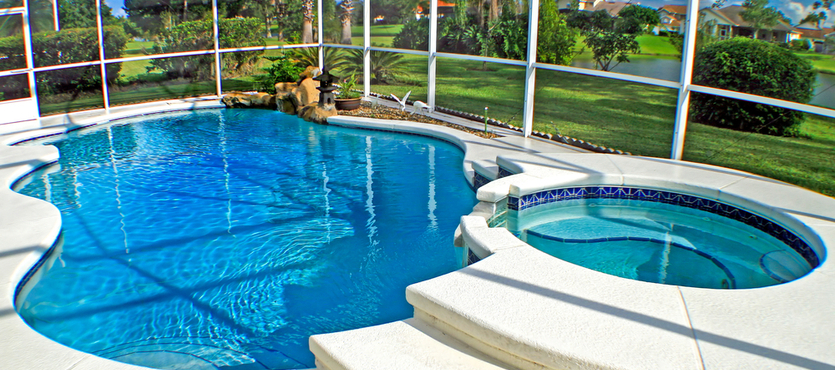There are many different reasons your pool may have a leak, oftentimes the cause of the leak relates to the type of pool you have. For instance, fiberglass pools often develop leaks related to the plumbing if saturation or settling occurs. On the other hand, concrete pools tend to develop cracks related to age or sharp objects hitting the side of the pool.
Some of the most common reasons a pool leak will develop include:
- Pumps and/or motors are not working properly
- Wear and tear over time can lead to leaks
- Plumbing beneath the pool breaks down, leading to saturation of the ground and ultimately leaks
- Loose or poorly fit accessories, such as railings or tiles
If you notice your pool losing more water than normal, it’s important to address the cause of the leak and have it fixed as soon as possible. Otherwise, as water continues to leak from the pool, it’ll saturate the ground or base beneath the pool, and this can lead to additional issues over time.
Need help finding the cause of your pool leak in South Florida? Contact us today!
Common Causes of Leaks in Fiberglass Pools
Fiberglass pools and spas can last for 25+ years without issue, but that doesn’t mean they are immune from developing cracks. Some of the most common causes of cracks or leaks in a fiberglass pool include:
- Plumbing leaks beneath the pool that lead to saturation or settling – it’s not always easy to identify leaks related to plumbing issues because the intake and return lines are located beneath the pool decking.
- Fissures in the gelcoat surface can also occur and contribute to leaks, often resulting from improper handling and installation. The cracks need to be repaired and repainted as soon as possible to prevent the cracks from spreading and causing larger leaks.
Common Causes of Leaks in Concrete Pools
It’s very common to see a Florida swimming pool made from concrete or gunite because these pools are the most durable with the longest lifespan. Still, if there is a crack that forms in a concrete pool it must be addressed right away.
- A sharp object can create a crack in a concrete pool
- Age, along with wear and tear can also contribute to the development of cracks in concrete over time.
- If decorative tiles are loose or detached, this can also contribute to a leak. The same is true for other loose or poorly installed accessories including railings, the skimmer pad, and so forth.
Repairs are not always as complicated as you might think, especially if they are conducted in a timely manner. In many cases, simply injecting a flexible polymer adhesive into a swimming pool may be enough to fix the problem and stop the leak from spreading. This can be applied without even draining the pool.
Common Causes of Leaks in Vinyl Pools
Cracks or tears in the vinyl lining are the most common reason for leaks in a vinyl pool. A sharp object can cut the side of the pool. Luckily, it’s not that difficult to patch and repair tears in a vinyl pool. Still, it should be taken care of as soon as possible otherwise the leak will spread and cause further issues.
Leaks Caused by Pumps & Plumbing
Movements in the ground or corrosion that occurs over time may contribute to underground leaks. If damage is not too extensive, PVC pipes can be repaired but in more extreme cases they will need to be replaced.
It’s important to check the suction lines responsible for carrying water to the filter, chlorinator and heater to ensure the leak is not coming from there. Pumps should also be thoroughly checked for wear and tear, and a new impeller or hose might be necessary.
The only way to know for sure how to best address a leak, and to find out where it is coming from, is to call out the experts. We are more than happy to help! Learn more

